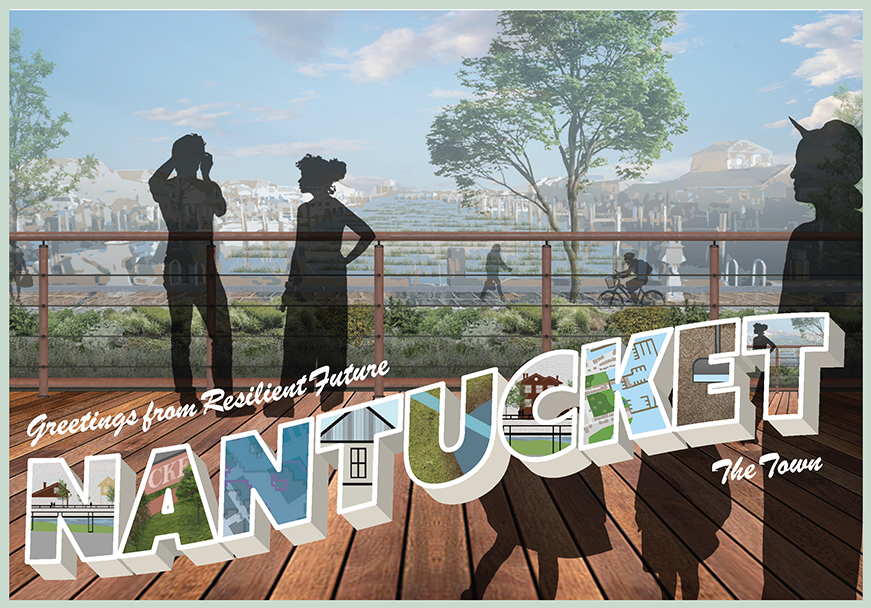Known for its storied history of whaling, Nantucket is a small 48 square mile island that sits about 30 miles south of Cape Cod and is a popular summer colony and tourist destination. Throughout its history, the island has faced hardships including the decline of the whaling industry, a massive fire in the mid-1800s and depopulation though the mid-20th century. Today, like many coastal communities, Nantucket is facing a new challenge- the impact of sea level rise and climate change. Streets in downtown Nantucket have seen major flooding and outlying areas of the island are experiencing erosion at an alarming rate.
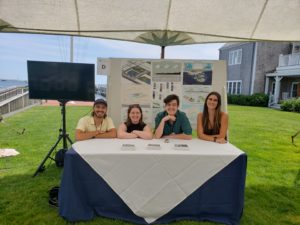
This past spring, under the leadership of Northeastern School of Architecture faculty members Sara Jensen Carr and Cullen Meves, a group of Northeastern students formed a team to participate in the Envision Resilience Nantucket Challenge. The Challenge called on interdisciplinary teams of graduate students from leading design universities to reimagine Nantucket Harbor under the latest projections of sea level rise. These projections are dire, with a possible regular incursion of water 4.13 feet above local mean sea level by 2060 and more than doubling by 2100. This presents a complex challenge as the island must grapple with how to reconcile these projections with the tourism industry, land conservation, and the preservation of the island’s historic built environment.
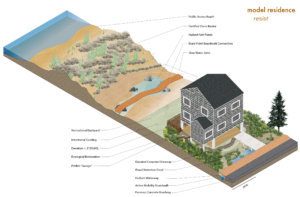
Northeastern worked alongside other teams from the Harvard Graduate School of Design, the University of Miami, the Yale School of Architecture, and the University of Florida. The students were asked to identify risks, research strategies to mitigate flooding, erosion, and other effects of sea level rise, and propose adaptive designs. The two classes worked in tandem throughout the semester, with Professor Meves’ Urban Ecologies and Technologies class doing detailed spatial analyses and researching engineering and infrastructural solutions, and Professor Carr’s class proposing designs for the three study areas around the Harbor. Even if limited by the pandemic, the semester still provided a rich opportunity for experiential, applied learning, as students were taken on “virtual field trips” by local wildlife biologists, attended weekly evening lectures with climate experts from across the nation, and conducted interviews with local residents.
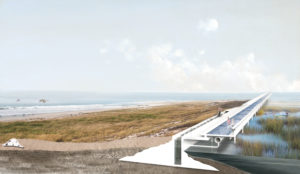
The theme of the Northeastern team’s proposals was “Transitional Ecologies: New Public Infrastructures for Nantucket,” and focused on how the island’s coastline, roads, and public spaces could adapt and protect against the threats of climate change. At the end of the semester, student projects were reviewed by a jury of renowned design professionals. Professor Carr and a small group of students also traveled to Nantucket in early June to present their visions for a sustainable, resilient island to the wider community at an outdoor event. Work from both classes is also being exhibited in downtown Nantucket through December 2021. The challenge has also garnered statewide and national attention. LARC/ENVS student Cassandra Lanson’s project was recently featured in Landscape Architecture Magazine, and LARC/ENVE student Alexandre Renaud’s concept for flood-resilient residences will be featured in the Trustee’s 2021 State of the Coast Report.
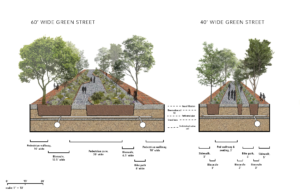
The Northeastern students who participated in the project were Sabrina Dengler-Coletti, Yizhou Huang, Bhavyasri Kattamudi, Daniel Nemec, Kyle Wire, Krystal Cai, Piers Ellis, Melissa Jacobs, Sophia Pinto, Emma Tracy, Emerson Campbell, Noah Wendel, Alex Renaud, Mia Kania, Emma Tracy, Jack Dorland, Evan Bradley, Ke-Ping (Cammy) Kuo, Cassandra Lanson, Jasmin Dickinson, and Emerson Campbell.

